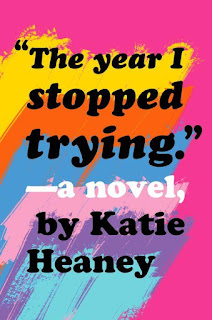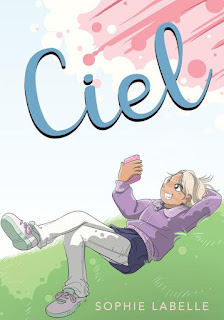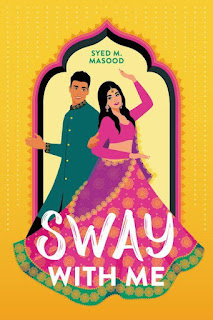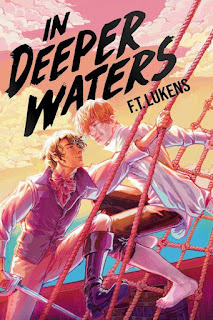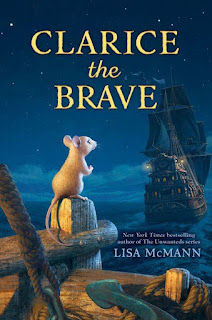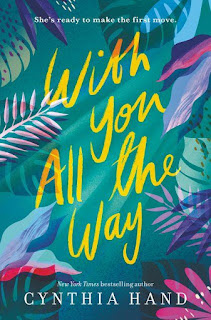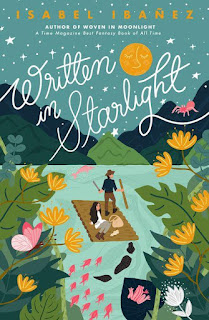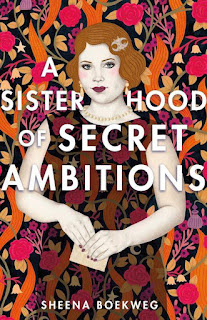In some of these stories, originality is achieved by having the protagonists be gender queer, but in this day and age, that's hardly novel. There are some clever settings (like Eulberg's story set in a London Eye capsule). There are a few funny pieces (Meyer's own tribute to the two-friends-and-one-bed set up). However, mostly this is more of the same old same old. If you really like the idea of romance stories, then these exercises may appeal to you, but for me the draw of a romance is not the tropes, but the characters. And within a maximum length of thirty pages, it's really hard to build the emotional attachment to the characters that gives a romance its pull.
Thursday, March 24, 2022
Serendipity: Ten Romantic Tropes Transformed, ed by Marissa Meyer
Sunday, March 20, 2022
The Year I Stopped Trying, by Katie Heaney
Saturday, March 19, 2022
A Rush of Wings, by Laura E. Weymouth
A few months later, Rowenna's mother returns to them and only Rowenna can tell that it is in fact the demon, now masquerading in her mother's form. When Rowenna tries to stop the demon, it curses her with muteness and transforms her brothers into swans. Turning the villagers against them, her mother forces Rowenna and her swans to flee for their lives.
To break the curse, Rowenna must knit a shirt made of nettles for each of her brothers. To do that, Rowenna needs to lay low and avoid attracting attention. But Scotland is seething under English occupation and Rowenna and the swans attract attention: Torr, the English tyrant who leads the occupation, becomes obsessed with the powers that he believes Rowenna has and what they could do to enhance his own power. And Rowenna, forced by him to develop those powers, is learning their true extant.
It's very hard to read this book and not compare it with Elizabeth Lim's Six Crimson Cranes, which also adapted the same fairy tale. Weymouth's take is prettier, grounded in a more realistic setting, and more literarily ambitious, but Lim's novel is much easier to read and track. Weymouth's proses drifts and wanders and it is frequently hard to follow the action. It was probably mostly due to my recent familiarity with the story (from reading Lim first) that even made it possible for me to follow this version at all. And for all the talk about highlanders and the occasional "aye" or "lassie," there is surprisingly little of Scotland here so even the advantage of the setting is largely wasted. Where Weymouth's does do a better job is in showing Rowenna's character growth and her ability to navigate her conflict with her mother. This is mostly due to Weymouth's more philosophical and cerebral take on the story, which Lim primarily treated as a swords-and-sorcery tale.
Tuesday, March 15, 2022
You'd Be Home Now, by Kathleen Glasgow
Four months later, Joey is let out of rehab and returns home. Emory is determined to make sure that everything stays fine. She'll keep an eye on Joey and make sure he's fine and stays off drugs. Never mind that her parents don't know how to cope with him and ignore her altogether. Never mind that people at school want him dead for what he "did" to that dead girl. It's all going to be fine. That is, until Joey disappears.
A non-stop drama that builds up gradually and keeps your attention to the end. It starts as a simple tale of identity about Emory's search for self and could have stayed in that realm and been successful. There's a lovely minor character named Liza who steals the show by channeling all that good advice stuff about standing up for yourself and not taking crap from bullies that you wish every YA novel would have. In a book about identity, she would have saved Emory and they would have lived happily ever after.
But the novel isn't really about standing up to bullies, it's about opioid addiction and the way it is destroying communities. Emory's search for self isn't about facing off against a petty queen bee, it's about finding the inner strength to be the person her addict brother needs her to be. As these things are a group effort, it's also about pulling her parents along with her and having the entire family come together to save Joey. It's a harrowing, intense, and authentic look at a family struggling to deal with addiction. Well-written and thought provoking.
Monday, March 07, 2022
Ciel, by Sophie Labelle
Added to these questions of identity are Ciel's issues with maintaining the relationship they have with a boyfriend who has become more and more distant since he returned home to Iceland. Keeping a transoceanic relationship going is hard and Ciel isn't even sure they want to keep trying: there's a new trans boy in their sights!
Aside from the fact that the story is largely bereft of cisgendered main characters, the book is surprisingly sparse. So its appeal lies in the novelty of the characters. The key plotlines (Ciel's relationship with the Icelander, their vlog and some negative reactions to it, Stephie's embrace of her feminine identity, and Ciel's conflicted relationship with gender overall) are present as ideas but not really developed. It's busy, but doesn't really go anywhere.
Sunday, March 06, 2022
The Pants Project, by Cat Clarke
Coming out as a transsexual isn't something Liv is comfortable with doing yet. Liv sees the way people look down at his non-traditional family (Liv has two mothers).
For Liv, standing up against the dress code is a smaller battle, something manageable. After all, even some girls don't like wearing skirts. So, while Liv works up the courage to come out, Liv can take on the school's rule. But Liv's not entirely correct. Fighting for the right to wear what one wants means putting everything on the line, jeopardizing old friendships and finding new allies.
The book is a busy story with lots of subplots, but an overall message of being yourself and resisting peer pressure. Liv makes a few mistakes along the way, but she demonstrates maturity and generally makes good choices. While Liv's gender identity is an important issue, Clarke wisely puts the topic in the background and focuses the story's drama on the fight over the dress code. It's a paper tiger of an issue but that makes it a cleaner target for the middle reader demographic. And it gets the message across effectively. There is a sense that Liv will prove just as capable at working out who Liv is.
Saturday, March 05, 2022
A Short History of the Girl Next Door, by Jared Reck
Then an unexpected tragedy throws Matt into a bad place, where he could really use Tabby's support, but she's not there for him. Grieving and angry, Matt lashes out at everyone around him. It takes some hard lessons from his family for Matt to re-center himself and move on. Learning to put his friendship with Tabby in perspective is central to that healing process.
A few months back, I reviewed Reck's latest book (about Swedish-American food truck sellers) and afterwards went looking for other books by Reck. This is his first novel and, while it shows the same finely depicted characters, I didn't care for it as much. There's a LOT of sports action in this one and I find that hard to get into. If you like male bonding on the court, then there's some well-crafted scenes to take in, but I find it pretty boring stuff. More important, I didn't find the story (and its plot twist in particular) all that compelling. There are so many books about grief and Jerry Spinelli and John Green have covered this territory well.
Reck is a great writer. While the novel contains the swearing and flatulence humor that seems to be required in "boy" books, he gives a lot of depth to Matt. There's a beautiful set of scenes mid-way through the book where Matt and Tabby have a real heart-to-heart about toxic masculinity that really makes the book. Matt's relationship with his little brother is awfully sweet as well, showing that there's much more than just pining after the girl. There really are not a lot of good contemporary YA books with believable straight male characters (in striking contrast to the past when all children's books were about boys). I have no complaint with that shift in publishing trends, but it is still nice to see some strongly crafted, emotionally sensitive books about boys.
Tuesday, March 01, 2022
Rural Voices: 15 Authors Challenge Assumptions About Small Town America, ed Nora Shalaway Carpenter
Not so much.
There are a few outstanding pieces like Monica Roe's "The (Unhealthy) Breakfast Club" about poor rural kids doing their homework at the McDonalds in order to pick up decent Internet. Joseph Bruchac's reminiscences about growing up in the 1950s are by their nature full of depth and nuance. But for the most part, this collection is the same old same old. Sensitive intellectual (and usually gender queer) teens who chaff at small town prejudice and ignorance. It's tired stuff and insulting to its subject. And it's not terribly realistic.
I would set out a challenge: create a story about young people who like where they live and don't want to run away to the city. Teens who by the nature of their socioeconomic status spend a good part of their day doing chores to help their families. Who get up before the dawn and spend an hour on a school bus working on their homework. Who see church as a social experience that gives them identity rather than as an enemy of their creativity. Characters, in sum, who don't hate the culture they come from. In this anthology, the only time a character seems to like their roots is when they are Latinx or Black or Native American. That's more political than true to life.
Small town America doesn't have to be the bogeyman. It's a shame that a collection that claims to challenge assumptions instead chose to reinforce prejudice.
Sunday, February 27, 2022
A Quiet Kind of Thunder, by Sara Barnard
Rhys is a new enrollee at school. He's deaf. The headmaster, aware that Steffi knows some British Sign Language (BSL) (which she picked up as a therapy for her mutism), asks her to orient Rhys and help him get acquainted with their school. Despite the difference in their handicaps, they bond and become friends. And the friendship morphs into a romance.
The relationship is far from smooth. While both of them confidently believe they understand each other's challenges, they quickly learn how rudimentary their knowledge truly is. And the petty misunderstandings that accompany any relationship become a bigger deal when dealing with such significant communication barriers. With all of this added on to the whirlwind of a first romance for the two of them and it is not smooth sailing. Things come to a head when the young couple slips away from London to spend a secret weekend in Edinburgh and an accident puts their physical limits to the test.
Sara Barnard continues to astonish me. She writes books with modest premises that seem to blossom into these amazingly complex and significant observations. On its face, the story is nothing spectacular or now. What makes this book (and all of her other novels) stand out is her consistent strong character development. Her characters are complex and defy stereotypes. Motivations are nuanced. Young protagonists have age-appropriate and realistic responses to their environment, being capable of both drama and intellect. Adults are flawed but mature and responsible. They understand their children and support them (even if they don't always do what the children want). In sum, the characters feel like real people.
Steffi and Rhys have different challenges in growing up with their distinct disabilities, which are portrayed well, but Barnard also manages to show us similarities. Both of them bear an adolescents' misunderstanding of responsibility and expectations (Steffi lacks confidence while Rhys is unrealistic about expectations). Both have trouble with trust, although Steffi's issues are rooted in bullying while Rhys's come from microaggressions. Both of them are sensitive and aware of the way the world discriminates against them because of their disabilities although Steffi tolerates it better than Rhys does. The fact that I can observe these subtle differences between their characters gives some sense of the nuance in the character development.
The novel is imperfect. The story is laden down with a number of subplots (a dead stepbrother, a mother's anxiety, etc.) that are never properly addressed and Steffi's codependent friendship with her BFF Tem is imperfectly resolved. Shedding the former might have provided an opportunity to better address the latter. The overall beauty of the book, though, is its simplicity. Getting to know these two young people -- in their flaws and glories - made me fall in love with them and their story. It's just a boy-meets-girl romance, but with the character-driven approach of the narrative, they become people I truly cared about. So I wanted to be there with them as they worked through their problems and to be able to cheer for them as they figured things out.
In sum, a modest story that proved to be a good read from a consistently excellent writer.
Thursday, February 24, 2022
Sway With Me, by Syed M. Masood
Recognizing his weakness, Arsalan turns to the daughter of a prominent matchmaker in his class named Beanish, in hopes that she can find him a girlfriend. Beanish has a request of her own: she needs a partner for an upcoming dance contest. Arsalan knows nothing about dance, but he'll do whatever it takes to get her help with his problem. She in turn solicits the help of Diamond, a stylish and athletic boy who helps Arsalan bulk up for his role.
The situation (and Diamond in particular, with his habit of referring to himself in the third person) is comedic and overall there is a rom-com element to this story, but it has several serious themes as well. Beanish's dance is not actually for a contest but for a more important purpose: saving her sister from an unwanted marriage. And Arsalan is not just socially awkward, but also a survivor of horrific childhood abuse. Masood's writing beautifully balances out the light and the heavy, often at the same time, as in this passage which so crushingly depicts Arsalan's association of love and abuse:
Before I could respond, her lips -- accidentally I am sure -- grazed the crook of my neck. Their touch was soft and impossibly delicate against the spot where my father had once pressed a match and threatened to burn me.
And it's not just Masood's sensitivity to complex emotional states that makes this story shine. Culture and religion feature prominently and treated with some sophistication. Some of the pious (the intended groom of Beanish's older sister and Arsalan's father) are negative, but Diamond (for all of his vanity) is a positive role model for religion. Nana's skepticism (rooted in intellectual pursuits) contrasts with Beanish's instinctual rebelliousness. Arsalan stands between them all, full of doubt, picking out his own understanding of faith.
Not everything worked for me. I thought the father's abuse was over the top and not really sure it was necessary for it to be so, but overall this is a beautiful story. Masood is such an original writer and the characters so vibrant and interesting that I can't help but recommend the book. This is a joyous book about friendship, adopted family, and loyalty. While rooted in Pakistani-American experience, there is nothing particularly exclusive about the story.
Sunday, February 20, 2022
Pax, Journey Home, by Sara Pennypacker
Pax, meanwhile has grown up and built a family. Safe from war but now threatened by the return of the humans, he goes out in search of safer spaces to raise his young family. While intending to leave his three kits with their mother, his stubborn daughter tags along and Pax is forced to bring her along. Pax introduces her to the forest and to the ways of the humans. He tries to explain to her that some humans (like his Peter) can be kind. The eventual reunion with Peter is marred by his kit falling ill and Pax must make a fateful decision to trust Peter to take care of the young one.
The original Pax always seemed a bit too complex to be a children's book -- its style too moody and its story difficult to follow. The sequel is even more so. This is partly due to the heavy reliance on actions and characters from the predecessor (I would strongly recommend reading or re-reading Pax before reading this book). However, even standalone, the novel's primary themes of environmental devastation, suicidal ideation, and grief are more personal and much darker.
I really appreciated the karmic circularity of this story, allowing the themes of the first book to come back around and the arc to achieve pleasing closure, but this is overall a weaker story.
Saturday, February 19, 2022
In Deeper Waters, by F. T. Lukens
But Tal's plans to keep a low profile are thrown asunder when he rescues a mysterious boy named Athlen from a group of pirates. The two young men form an immediate attachment in spite of knowing so little about each other's secrets. And when Tal himself is kidnapped, it is Athlen who must rescue him and help him save his kingdom. And along the way Tal must also deal with how to come out publicly as a mage.
Swashbuckling sea adventures in a fantasy world, but the book lacks much of the urgency of a good adventure. The fantasy setting itself is also largely underdeveloped. So what does the story have? Lots and lots of exposition and discussion. This is a story where the characters talk and talk and talk some more, so that by the time anything actually happens, we've pretty much hashed through it from all of the angles.
Homoerotic elements are present but largely played down, much to the detriment of the story as the potentially hot romance between Tal and Athlen never quite takes off. In their world, homosexuality is a non-issue, so it is the side plot about Tal gaining the self-confidence to come out as a holder of magic is a cute way of writing in a coming out story. All of which brings us to the crux of the matter: the story has cuteness and potential, but it never delivers on its promise.
Sunday, February 13, 2022
Kate in Waiting, by Becky Albertalli
The novel is an extremely brisk read that I found nonetheless challenging to get into. Albertalli drives the action forward almost exclusively through dialogue which sounds simple until you try to read it. Exposition and reflection take a back seat to a rather relentless drive forward as one interaction leads to another. Blink and you'll miss an important plot point. You certainly never get bored, but you stand a good chance of getting left behind. Admittedly, this is a pretty good depiction of the whirlwind of adolescent relationships, but in written form it makes it hard to invest in the characters.
The book's heavy use of the F-word is unnecessary and distracting, adding little to the story except to become numbing. It probably also draw unnecessary attention to the book for people looking for excuses to keep it out of young readers' hands.
Otherwise this is a pretty much by-the-numbers dramarama adventure (i.e., kids put on a theatrical production -- Once Upon A Mattress in this case). The eventual resolution of Kate and Anderson's romantic lives and their friendship with each other is largely uneventful and unsurprising.
Saturday, February 12, 2022
Clarice the Brave, by Lisa McMann
Humans are far more complicated. When the crew rise up in a mutiny, the captain and his supporters are set adrift in a small boat. Clarice finds herself on the small boat, while Charles Sebastian is left behind on the ship. Separated by leagues of open sea, Clarice is distraught and determined to find a way to reunite with her weaker brother.
What can a little mouse do? With no one else to turn to, Clarice cleverly befriends Special Lady, the captain's cat. Faced with a mutual need for each other's support in order to survive, Clarice and Special Lady form an unusual alliance.
An action-packed story of adventure and friendship. I was nonetheless disappointed with the book. Honestly, based on the cover and a cute blurb, I was hoping for a gentle animal story (i.e., Stuart Little-esque adventures on the high seas) but this story is too gory for that. There's an awful lot of death (often by unpleasant means) and it's not a very cheery story. It's also a surprisingly morally ambiguous story without any clear heroes and an ambivalent ending.
Thursday, February 10, 2022
With You All the Way, by Cynthia Hand
Given that Ada's problems seem to come back to her fear of sex (something which doesn't seem to bother anyone else!) she decides that it is high time she did something about it during the vacation. There aren't a lot of young people her age at the conference except for geeky Nick, whom Ada would never have given much thought to, but who's available (and willing). Awkwardly, the two of them plan out how it will happen.
While following in the proud steps of Judy Blume's Forever, this is a generation removed and then some! It's a very plain and explicit discussion of sex, whether it's Ada's fears of it, her desire to have it, and her preparations with Nick. As many YA books as I read, you would think I've become unfazed by sexually explicit stories, but the directness of this book often made me uncomfortably aware that I'm a middle-aged guy reading about an underaged woman's intimate sexual feelings. My gut tells me that Hand gets the tone right. Ada is a perfect product of modern sex education, a target of the mass media sex, and the eternal ignorance of an adolescent on matters sexual -- it's all as painfully awkward as you can imagine it could be. I certainly was not like this as a teenager, but modern kids have much more information at their fingertips, even if they are no more emotionally mature than we were.
Infidelity, which comes up in at least three distinct cases in the story, is another theme. It doesn't seem to serve much purpose except to link together mother, sister, and Ada, but I did not see where it was going.
I really liked the sister dynamic. Ada plays the usual middle child and performs admirably sorting out her older sister's recklessness while protecting her little sister from all the shenanigans. Little sister also provides comic relief throughout.
It's a nice story but aside from providing a really drawn-out sexual encounter (and a week of planning leading up to it), I'm not sure that the book delivers much value. In sum, a book that people can read for its scandalously frank discussion of teen sex while enjoying a largely functional story with some sweet sisterly bonding. However, if teens having frank conversations about mature topics and engaging in activities that they aren't quite ready for makes you uncomfortable, this is not a good book for you.
I do wonder how many young readers would actually enjoy reading this? Would they find a heroine to whom they could relate or would they feel that the author was being condescending?
Sunday, February 06, 2022
The Mirror Season, by Anne-Marie McLemore
At that party, she was assaulted, but she was not alone. A boy, who she barely knew, was raped nearby at the same time she was. Afterwards, she took him to the hospital but fled the scene to avoid having to explain what happened. Months after the incident, at the start of the school year, she is surprised to run into the boy again, newly enrolled at her school. He was so drugged at the time of the assault that he doesn't recognize her now. She could easily turn away and ignore him, but those shards of silver mirrors she sees everywhere tear at her and drive her to protect him. She knows she could come forward and fill in the blanks in his life, the things he can't remember from that night, but telling him means also confronting what happened to her ... and what role she played in what happened to him.
An emotionally intense trip through the experience of rape and its emotional aftershocks, buffered somewhat by magical realist imagery inspired by Hans Christian Andersen's Snow Queen (and probably Like Water for Chocolate). It's definitely not for the faint of heart, but this exceptionally honest and raw portrayal shares much about the experience. The focus is not so much about healing as it is about understanding the experience and processing it. Ciela is not always honest about what happened and it takes several shocking iterations for the full story to emerge.
McLemore writes beautifully. Whether it is describing Ciela's talent as "the part of me that speaks the language of flour and sugar" or the many ways she describes her grief (e.g., "All of me has poured out, like the middle of a pinata cake") this is gorgeous writing. She also takes considerable risks to create strong and unexpected scenes. A romantic and sensuous interlude, stunning for its incongruity and yet defiant appropriateness, is a notable highlight -- beauty in the midst of horrible cruelty and suffering.
I have something of a soft spot for magical realism. The imagery of baking and trees (both in their leaves turning to mirrors and their mysterious disappearance) are used in multiple and powerful ways. Of the too, I generally found the food references less intrusive than the mirrors (which I never quite fully understood -- hidden guilt? anger?). Ciela's ethnicity, sexual orientation, and class come up frequently, but are largely peripheral to the overriding theme which is about recapturing a sense of self in the wake of a violation.
I know that many people avoid stories about sexual violence like the plague and that for some this is because of how triggering the experience of reading about it can be. However, this is a book -- as the afterward makes clear -- written by a survivor with the aim of giving an honest survivor's voice to the experience. It is an insightful voice, a proud voice, and one that ultimately refuses to be silenced. This is a book worth reading.
Friday, February 04, 2022
Jude Banks, Superhero, by Ann Hood
There's a later glimmer of hope when he meets Clementine in a grief support group and they develop a strong bond. She, too, lost a sister and seems to understand what Jude is feeling in a way that his peers mostly don't. But too late Jude realizes that Clementine's feeling are of a different and more dangerous nature and he is out of his depth in trying to console her.
Intended as a book for young people who are coping with the loss of a sibling, I can see how learning about another child's experience might be helpful, but it's a dreary example. Jude alternates between despair and anger, and never quite manages to work through his feelings to start healing. Instead, his grief seems just to slowly suck him (and his parents) down. It's a sensitively-told story, but without any resolution there isn't much inspiration for a child who actually wants to feel better.
Sunday, January 30, 2022
Written in Starlight, by Isabel Ibanez
Given her sheltered prior existence, her chances in the wild are not good. The jungle is a treacherous place. Treacherous wild animals are everywhere and even the plants are dangerous. But she is fortunate enough to run across an old friend -- her former guard Manuel -- who still feels loyalty towards her. Together, they battle with caimans and jaguars, and try to stay ahead of the indigenous Illari who are hostile to their presence. Yet it is precisely these Illari to whom Catalina must turn. If she is to regain her throne, she'll need their support.
The Illari, however, want nothing to do with her dynastic squabble and they have something rather more pressing to deal with: a mysterious force that is killing off all life -- human, animal, and plant -- within the jungle. The Illari at first blame Catalina and Manuel for bringing this evil, but the true cause is far more serious and poses an existential threat to the world.
A very lush story that sets fantasy elements within a South American rain forest setting. The adventure moves at a luxurious but utterly satisfying pace as Catalina faces a variety of challenging situations trying to survive in the jungle. A history of forbidden attraction between Catalina and Manuel gives the story some smoldering passion. A romantic triangle opens up when they reach the Illari. It all proceeds swimmingly. Unfortunately, things get really rushed in the last fifty or so pages as a whole new series of facts and characters are introduced. The climax, which develops out of thin air in a breathtaking ten pages, is strongly out of character with the rest of the book and it's hard not to feel like it was a rush job and a cheat.
While it is not acknowledged anywhere, this novel is a sequel to Ibanez's Woven in Moonlight. I suspect that having the full backstory would have made reading this book more enjoyable. Some of the confusing innovations at the end are apparently based on characters and ideas developed in the first book.
Friday, January 28, 2022
Clues to the Universe, by Christina Li
When Ro and Benji are paired up as science partners, they both have strong motivations to do well, even if their approaches are different. They make a deal: Benji will assist Ro in her rocket experiment and Ro will help Benji find his father (a not-so-insignificant task in the pre-Internet setting of the story). Significant set backs along the way present challenges that they have to overcome. And an act of betrayal triggers a chain of events that force them to reconsider their priorities.
A predictable and safe story of friendships formed and challenged -- standard middle grade stuff. The vaguely 1980s or early 1990s setting may confuse readers as only the absence of computers and cell phones provide clues to the era. Bullying, divorce, and grief are all raised as issues, but not really dealt with in any depth. The story ends on a set of super happy notes. It's a fine read, but not overly memorable.
Sunday, January 23, 2022
A Sisterhood of Secret Ambitions, by Sheena Boekweg
In this alt-history, Abigail Adams's threat to her husband to pay attention to the women bears fruit in the formation of a shadow organization of women, called the Society. Throughout American history, it has indirectly held on the reins of power through the manipulation of husbands. Broken into castes, Matrons rule, Spinsters fight, and Gossips maintain surveillance. Young men are noted and earmarked for success by the Gossips and promising young women -- pledged to be loyal to the Society -- vie for the affections of these men so they can be positioned to control them when their husbands rise to power. Never in the spotlight, these women know that the only way they can hold power is to pull the strings in secret. The world would never tolerate a woman in charge.
It's 1926 and 17-year-old Elsie is one of a set of girl who have Andrew Shaw in their sights. With help from their Society sisters, they try to win his heart. Ellie wants to make a difference in the world and marrying the man most likely to become president is the way to do it. But Ellie's heart is not really into the hunt. Her older brother, supported by the Society through his well-place spouse, is making a name for himself. Ellie wonders why she can't do so as well in her own name. Andrew Shaw, while his heart seems to be in the right place, is nice enough but Elsie doesn't really fancy him. She prefers the brooding and dangerous Patch, a young man with a revolutionary agenda. And when his plans lead to tragedy, Elsie is forced to decide whether to pursue her plan of gaining power by becoming Mrs. Andrew Shaw or whether to follow her own dreams.
A striking and original story that explores a variety of contemporary feminist topics in an easily digestible format. Don't let the highly retrograde-sounding premise and the historical setting fool you into thinking this is just some young women wearing fabulous gowns and throwing themselves at a guy (although there are fabulous gowns and a guy). This is really a much deeper discourse about what it means to be a feminist in contemporary times. Race, class, sexual orientation, body positivity, and gender identity all take a turn making an appearance (in this alt-history, folks are surprisingly worried about equality and economic injustice). But it is really the oldest issue of all -- agency -- that takes center stage. All the more so because of the inherent contradictions that are present in the premise of women seeking power through marriage and children.
This is a book which I would truly love to hear young people discuss. As a member of the previous generation of feminists, some of the arguments here are unfamiliar or strange to me, but I know I would learn a lot by hearing the next generation tackle them. And the book is full of quotable passages (like the one above) that act more as landmines than hidden gems.
Nothing is perfect. I found Ellie's growth as a character unsatisfying and the fluidity of the story gets sacrificed for the more ideological aims of the novel. However, this is a very thoughtful book which has used the alt-history rubric in the best possible way: to facilitate deeper thought and discussion about feminine ambition in contemporary society. A memorable read.

